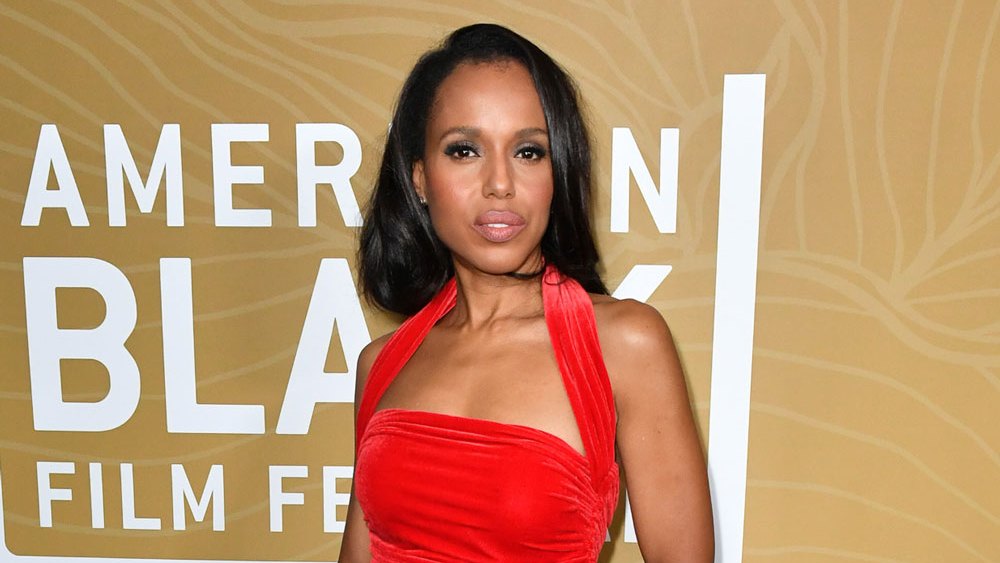When Kerry Washington stepped onto the gold and black carpet at the 1 Hotel in West Hollywood for the fifth ABFF Honors ceremony on March 5, she had the trailblazing Black women who forged a path for her to become an actor, producer and director on her mind — and an homage to one on her person.
“I’m wearing an actual dress that Whitney Houston wore,” Washington told Variety, explaining that “When you get an award for excellence in the arts, you’ve gotta go to Black excellence.”
As Washington prepared for the event, where she was honored alongside Courtney B. Vance, Janelle Monáe and Macro’s Charles D. King, plus filmmaker Kasi Lemmons and the cast of “Eve’s Bayou,” all for their contributions to the arts, one word came to mind: community.
“I was thinking tonight about how lucky we are to be in community at a show like ABFF. We really get to have each other’s backs,” she shared. “Some of us — those who tred the path for Janelle and me — they were the first, and they were the breakthroughs, and often they were the only, so it’s important that we think of them and honor them.”
Washington was the first to the the stage during the ceremony, accepting her trophy from former U.S. ambassador and her producing partner on the upcoming Netflix film “Six Triple Eight.”
“’Excellence,’ according to the Oxford Dictionary, is the quality of being outstanding or extremely good,” she began. “I realized that one of the reasons this honor means so much to me is that in my quest for excellence, I have not always gravitated toward playing characters that society would label as ‘extremely good.’”
She continued: “I’m most often drawn to projects and to characters with flaws and vulnerabilities and messy, real-life challenges. I think that’s what makes us human. And our humanity, as Black folks in this country, in this world, especially right now, must not be taken for granted.”
Washington recalled attending the ABFF Honors in 2016, where she presented her idol Diahann Caroll with the Hollywood Legacy Award.
“I miss her so much, as you can tell from how I did my hair tonight,” the “UnPrisoned” star and producer quipped. “When she came up here to collect her award, I remember her remarking on how special this evening was, and how extraordinary and important that event felt. I got the sense that after a lifetime of being the only one and the groundbreaker and the first, that she was thrilled that evening to be instead in community, to be one of many, to be stepped in a glob of Black excellence everywhere she looked.”
Washington’s point in paying homage to Whitney Houston in dress and Diahann Carroll in speech was to illustrate the difference between those women’s experiences, and that of her own sisters in the trenches like Viola Davis, who once “explained that the historic nature of her achievements was not due to a lack of talented Black women in the business who came before her but rather a lack of opportunity.”
“But that landscape is shifting,” Washington added. “Gradually, we are watching it evolve in real time before our eyes. But not because we’re being given opportunity, but because we’re demanding it. We’re creating it. We’re making it happen.”
Janelle Monáe poses with Nicole and Jeff Friday at ABFF Honors
Aaron J. Thornton
The fifth ABFF Honors was an intimate, non-televised dinner and award ceremony, executive produced by American Black Film Festival (ABFF) Ventures founder and CEO Jeff Friday and company president and COO Nicole Friday (under their ABFF Ventures company) in association with Rikki Hughes (for Magic Lemonade) and de Passe Jones Entertainment. Hosted this year by Emmy-nominated writer, actor and comedian Deon Cole, the event seated only 200 guests, reduced considerably from past years.
“You should be proud to be here tonight. Do you know you are a select group?” Cole asked the crowd, joking, “That means Jeff and Nicole have lost a lot of friends; they’ve got to be going around town dodging people.”
Looking around the ballroom, though, the star power and cultural relevance of the attendees — which included Jonathan Majors, Nnamdi Asomugha, Javicia Leslie, Janine Nabers, Harold Perrineau, Amazon’s Latasha Gillespie, Salli Richardson Whitfield and Dondré Whitfield, Tommy Oliver and Codie Elaine Oliver — was immediately apparent.
But also notable was the way these trailblazer’s paths have intertwined. For example, early on in Monáe’s career, King was one of their agents, making it possible for her to transition from Grammy-nominated musician to award-winning actor, known for “Moonlight,” “Hidden Figures” and most recently “Glass Onion: A Knives Out Mystery.”
Honored with the Renaissance Award, presented by Yvonne Orji, Monáe noted that her mother was the driving force behind her frequent reinvention.
“She never told me ‘No.’ I was like ‘I want to be in the musical. I want to be in the Shakespearean program after school. I want to be an international thespian,’” Monáe told Variety, sharing the secret to her success. That mindset — if you can schedule it, if you have the opportunity to do it — you do it afraid, you do it scared and then you move on to the next thing.”
The evening turned emotional when TriStar Pictures president Nicole Brown presented the Classic Cinema award to filmmaker Kasi Lemmons for her 1997 feature debut “Eve’s Bayou.”

FIlmmaker Kasi Lemmons and the cast of “Eve’s Bayou” — Victoria Rowell, Roger Guenveur Smith, Lynn Whitfield and Meagan Good — with TriStar’s Nicole Brown onstage at ABFF Honors.
Photo by Kelvin Bulluck
Brown reflected on the first time she’d seen the movie. “I remember being struck by how proudly it plunges us into the interior life of a young Black girl, asserting with neither justification nor apology that such a perspective belongs at the center of the frame,” she said. “Kasi beautifully and articulately forged the space and time in which the existence of Black girls and Black women and Black culture is valued.”
In 2018, Brown noted, the film was selected by the Library of Congress for registration and preservation in the United States Film Library for being “culturally, historically and aesthetically significant.”
On the carpet, Lemmons reflected on the film’s legacy: “It’s nothing that you necessarily anticipate; I wasn’t expecting it at all. But what an honor. When I talk to young, Black women filmmakers, women of color and young people from all over, and they tell me that the film inspired them, that’s really what’s most meaningful. It’s great for all of us that are involved to make something that’s seemed to endure and continue to be celebrated.”
On stage, she was joined by members of the film’s cast – Lynn Whitfield, Roger Guenveur Smith, Victoria Rowell and Meagan Good, who made her feature film debut in the project —
“Because of you I can,” Good said, thanking Lemmons through tears. “When I was 14, I was looking at a unicorn. The first Black female director I’d ever seen and I didn’t see another one until I was almost 30. And now I am one.” (She most recently directed an episode of her Amazon series “Harlem.”)

Courntey B. Vance (center) with his children Bronwyn and Slater Vance at the ABFF Honors
Photo by Kelvin Bulluck
Last up was Vance, who was honored with the excellence in the arts (male) award, was joined for the special ceremony by he and wife Angela Bassett’s teenage twins Bronwyn and Slater Vance.
“It’s just inspiring to see my dad being celebrated for everything that he’s done,” Bronwyn Vance told Variety on the carpet. “He’s always implemented in us that we can reach such high levels as he has.”
Added Slater Vance: “It’s just a blessing because he’s a goal-driven man, but he doesn’t work for the acknowledgments, so to see him honored without desiring it, shows what a respectable man he is.”
Onstage, Vance made sure to thank Bassett, who was unable to attend due to an early call time for her Fox series “9-1-1” for her consistent, loving support.
“During this award season she’s been at two or three events every night, in addition to fulfilling her duties on the show,” Vance told the crowd. “So, tonight we give her the night off, so rest baby and get ready to keep doing the damn thing.”
Taking the stage to receiving his award from “Lovecraft Country” co-star Jonathan Majors, the Emmy and Tony-winning actor launched into a speech that more closely resembled a sermon.
“For years we’ve had to be satisfied with crumbs from the master’s table. What a blessing is it that we live in a time where we can tell our own stories. I think God for all of those trailblazers, those pioneers, those frontiers, men and women who had only negative images of themselves to serve as guides.
During Black History Month the past two years, Vance has sent text messages to friends celebrating impactful African Americans. As this year’s celebration came to a close, he says, “I realized that every day is an opportunity to celebrate those who had gone before and paved the way so if you wouldn’t mind … I would like to celebrate some of the people that were instrumental in me standing before you.”
Vance then spoke of those who believed in and uplifted him throughout his life and career, saluting everyone from his “Fences” father James Earl Jones, to his professors at Harvard and the Yale School of drama, as well as his late parents and dear family friends. In closing, he recited a poem by Beah Richards, memorably recited by Ruby Dee:
“Today is ours, let’s live it. And love is strong, let’s give it,” he began. “A song can help, let’s sing it. And peace is dear, let’s bring it. The past is gone, don’t rue it. The work is here, let’s do it.
Vance continued: “The world is wrong, let’s right it. The battle is hard, let’s fight it. The road is rough, let’s clear it. The future’s vast, don’t fear it. Is faith asleep? Let’s wake it.” Raising a closed fist in salute, as members of the audience did the same, he concluded. “Today is ours, let’s take it.”

Randal Finklea


